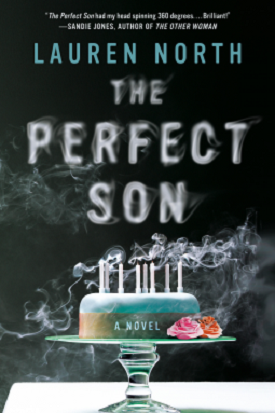 Today I welcome author Lauren North to Colloquium for the first time!
Today I welcome author Lauren North to Colloquium for the first time!
Lauren’s debut novel, The Perfect Son, is described as a “disturbing and shocking debut novel of psychological suspense.” She says that her constant worry about her children often “leads to little seedlings of ideas. A great example of this is when I wondered what if my husband travels away for work and dies and I’m left alone in a secluded house in a village where I know absolutely no one.” That was the genesis of The Perfect Son.
The story focuses on Tess Clarke, who wakes up in the hospital the day after her son Jamie’s eighth birthday. She’s sure she’s been stabbed, her son is missing, and her brother-in-law and her grief counselor are involved. But no one listens to her.
Her husband, Mark, died suddenly in a terrible accident a few months earlier. Since his death, Jamie has been the only thing holding Tess together. As they struggle to make sense of their new life without Mark, they find joy in brief moments of normalcy like walking to school and watching television together.
But now, in the hospital, Tess is confused and surrounded by people who won’t listen. To save her son, she must piece together what happened between Mark’s death and Jamie’s birthday.
The truth might be too much for Tess to bear.
Getting Out of Your Character’s Head
by
Lauren North
It wasn’t until after I’d finished writing The Perfect Son that I realized how emotionally draining the experience of writing it had been for me. In the novel, Tess is a distraught and grieving widow who is desperately trying to keep her son safe whilst also fighting depression.
It was so important to me that I represented the rawness of her emotions accurately. I wanted to show that losing a loved one is not something that a person can easily move forward from. There will be bad days, followed by glimmers of good days, followed by bad days again, and then worse days. I wanted to show the relentlessness of her grief and depression as she fought day after day to be a better mother, to care for her son, and to protect him when the whole world seemed to be against her.
Living in Tess’s head each day left me emotionally exhausted, and at the time I didn’t appreciate just how Tess’s emotions were affecting me. I would walk to collect my children from school after a day of writing and feel as though my thoughts were in a fog. Despite being a generally happy and positive person, I found myself sad for no reason and not sleeping well. Like Tess, I didn’t feel as though I was doing the best job I could as a mum, and found myself constantly thinking about Tess and her son Jamie.
Only when I’d finished writing The Perfect Son, and I felt my own fog lift, did I realize how important it is to step out of my character’s head in the same way I step into it each day. I’m now writing a new book, and while there are still days where I’m stuck inside my character’s head, I now make sure I have more time away from her, too.
Here are the five rules I’ve set myself to help me switch off:
1. Take regular breaks which involve leaving the house – whether it’s a walk with a friend, a trip to the library or the gym, I make sure I get out at least once a day.
2. Choose reading books in a different genre and read before going to sleep – reading is a great relaxer for me, and reading something light-hearted when I’m in a dark phase of a book resets my mind before bed and helps me sleep.
3. Set myself specific writing times and stick to them – I used to grab a spare twenty minutes of extra writing anytime I could – while the dinner was cooking or the kids were busy playing, but that meant that I was never switching off from it. Now I set myself specific times to write and if I find an extra few minutes in the day I exercise or read.
4. Talk to people every day – this is a really important one for me. A lot of my time is spent inside my own head, with my own characters, which doesn’t make switching off very easy. I make sure I pick up the phone and call a friend or family member at lunch time, or strike up a conversation with someone at the gym.
5. Take days off – this is something I used to be terrible at. Even at the weekend I would wake up early and write before anyone else got out of bed. Even if it was just for an hour in the morning, I found it meant I spent the entire day thinking more about my book. Now I make sure I take at least one whole day each week where I don’t turn on my computer or think (too much) about my book. It’s a great refresher and I often find the day after a break really productive.
Meet Lauren

Lauren studied psychology before moving to London, where she remained for many years. These days she resides with her husband, Andy, and her two children, Tommy and Lottie, in the Suffolk countryside. She strives to write whenever she’s not spending time with her kids. On school days, she relates that she’s at her desk by 9:00 a.m., writes for a few hours before taking a break, and resumes for another few hours in the afternoon. When her children are out of school, she begins writing by 6:00 a.m. and devotes two hours to her work, getting back to it in either the afternoon or evening, as their schedule permits. She says, “On a practical level, writing with children in the house means there is often a lot of stop and start, interruptions for snacks and board games and sometimes I’ll find I only write in ten minute bursts, so I’m not precious about what’s going on around me. I can write for any length of time, anywhere.”
Connect with Lauren on Facebook, Twitter, or Goodreads.
Thank you, Lauren!



10 Comments
Wow. Great post. I can imagine how taxing writing this story could be. It takes me some time to get out of a characters head when I’ve only spent a couple of days reading a book!
I think those same rules might apply to a reader of a very well-written book. I think it might be difficult, though, to switch from that book to another before I go to sleep. But that is an important step.
I often dream about the characters in a very well-written book
.
A thought provoking post about an author whose writing has deeply affected her everyday life. Glad to learn that the important and vital health breaks are being taken. The writing process is debilitating and requires walks, and interaction.
I can imagine how hard and draining it is to channel the emotions of your characters with such intense subject matter. I think the rules you’ve set for yourself are good ones and could help. However, since you’re living your character’s life, I wonder if you can ever get away before the book is complete. To paraphrase the great actress, Bette Davis: no one said writing was a career for sissies. I’m looking forward to reading the results of your angst.
As a parent, especially as a single parent, I have had those thoughts often. My sons are grown now, on their own & I still worry about them. I like those rules & they help me to realize I need to incorporate them into my own life. I think we all get wrapped up into something…work, kids or something else, & forget to shut off…to take care of our own personal needs. Thanks for sharing this. 🙂
The writing process has always intrigued me! As an avid reader, I really respect the art of writing! Such a great article.
That is fascinating. I’ve never heard a writer describe the need to separate from a character like that before, although I’m sure it’s a common experience. You must be extremely creative and empathetic!
It’s wonderful that you have found ways to not allow yourself to be overwhelmed by your characters. My granddaughter is going to be a play that de3als with death, grief, mental illness and drugs in November. She has already had her beautiful blonde hair dyed black for this role so she’ll be more comfortable playing it. She’ll soon be 21 years old and I’m going to tell her how you manage it because I have some concerns. This is so timely and I thank you.
I never realized that an author gets that involved, wrapped up and that much into the story their writing and the characters themselves.. In a way I think it’s good that you do because it probably shows in your writing and you put out better books. However, I can also see where there would be a downside to it. It must be very hard on you, possibly causing a little depression to set in when all you can think about is the lives of your characters and the storyline.
Lovely article! As a reader, I get wrapped up in a story and the characters, so, it makes sense that the author would do the same.